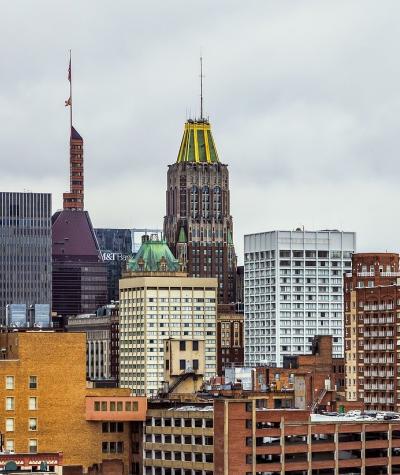The Baltimore City Council gave final approval to an ordinance that would create a new public financing program for candidates seeking local office. The legislation is the result of a city charter amendment, approved by over 75% of Baltimore voters last November, directing lawmakers to establish a system of public financing for city elections.
Now the ordinance is awaiting Mayor Jack Young’s signature, and if it becomes law, Baltimore City will become the fourth Maryland locality to approve public financing since 2013, following Montgomery County (2014), Howard County (2017), and Prince George’s County (2018).
As adopted by City Council, the ordinance would set up the Fair Election Fund to provide matching public funds, at a public-to-private dollar ratio of up to $9-to-$1, for small-dollar contributions made by Baltimore residents to city candidates who opt to participate in, and meet the qualification requirements for, the public financing program.
In order to qualify for matching funds through the program, candidates would have to raise a threshold number of small-dollar contributions from within the city, agree only to accept contributions of up to $150 given by individuals, and receive no campaign funding from PACs, corporations, or other organizations.
The ordinance also would create the Fair Election Fund Commission, a new city agency tasked with administering the public financing program. Among its responsibilities, the Fair Election Fund Commission would handle public outreach and education efforts in Baltimore City, with the aim of promoting more political participation by “members of communities that historically have been marginalized from elections and civic processes.”
The introduction of public financing in Baltimore could do much to expand electoral engagement within the city’s diverse population.
In a 2018 report on donors to Baltimore City campaigns, the nonprofit group Demos found that African Americans, who make up 63% of the city populace, accounted for just 32% of contributions received by candidates for Mayor and City Council in 2015 and 2016; other minority communities in Baltimore similarly contributed to candidates at disproportionately low levels.
Meanwhile, even as half of all Baltimore households earn $44,000 or less per year, households in the city with annual incomes above $100,000 – a group that constitutes less than 20% of Baltimore City’s population – provided at least 48% of all contributions received by candidates for Mayor and City Council in recent years.
Public financing programs have an impressive track record of broadening participation in local campaigns and producing donor pools that better reflect the demographics of city populations.
Multiple studies of New York City’s matching funds program have shown that the program has helped lead to campaign contributions coming from nearly every part of the city, including low income and predominantly minority neighborhoods.
Likewise, an academic report on Seattle’s Democracy Voucher Program found that that city’s rollout of public financing, in 2017, immediately led to a record number of city residents making donations to local campaigns, with over 20,720 Seattleites contributing Democracy Vouchers to candidates in the 2017 election. Seattle’s program also spurred higher rates of campaign donations by low-to-middle income residents, residents under the age of 30, and minority groups.
Based on these encouraging findings from other cities, Baltimore City’s implementation of public financing could transform the campaign process for local office.
With the availability of matching funds for small-dollar contributions made by city residents, candidates would have a strong incentive to redirect the focus of their campaigns to Baltimore’s population at large.
Following City Council’s approval of the public financing legislation on December 4, 2019, Mayor Young should sign the ordinance into law to fulfill city voters’ call for building a more inclusive democracy in Baltimore.
